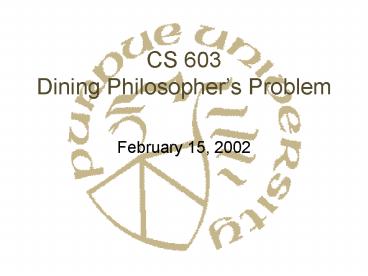CS 603 Dining Philosophers Problem - PowerPoint PPT Presentation
Title:
CS 603 Dining Philosophers Problem
Description:
Basic: Program that accepts NTP server as argument, gets and returns time from that server ... Deadlock free: Eventually someone new gets to eat ... – PowerPoint PPT presentation
Number of Views:128
Avg rating:3.0/5.0
Title: CS 603 Dining Philosophers Problem
1
CS 603Dining Philosophers Problem
- February 15, 2002
2
Project 2 Starts Today
- The winner
- NTP Client
- Basic Program that accepts NTP server as
argument, gets and returns time from that server - Three points for well document and tested
solution - Extras (worth one additional point)
- Fault Tolerant averaging solution Accepts up to
four servers and gives average after throwing
away bad servers - Class library Initialize sets offset from local
clock, get time returns local offset without
sending message
3
Dining Philosophers Problem(Dijkstra 71)
4
Dining Philosophers Solutions
- Simple waiting state
- Enter waiting state when neighbors eating
- When neighbors done, get forks
- Neighbors cant enter waiting state if neighbor
waiting - Problem
- Doesnt prevent starvation
- Requires checking both neighbors at once
- Race condition
5
Fully Distributed Solution(Lehman and Rabin 81)
- Problem with previous solutions
- Not truly distributed Requires some sort of
central coordination or global state - Non-Symmetric Different philosophers run
different algorithms - Additional properties
- Deadlock free Eventually someone new gets to
eat - Lockout free Eventually every hungry
philosopher gets to eat - Adversary One philosopher may try to starve
another - Cant just hold the fork indefinitely
- Communication only between adjacent philosophers
- No global state
- Cant communicate with both at same time
6
No Deterministic Solution
- Proof Assume solution for philosophers 1..n
- Philosophers dont know their number!
- Philosophers activated in order from 1..n
- Each takes one step
- Claim If symmetric at beginning of round, will
be symmetric at end of round - If anyone eating, all would be!
7
Probabilistic Solution
- Assume Random coin toss
- Guaranteed with probability 1 to break symmetry
- Idea Try to get one first
- Then get other
- If cant get other, put first down and try again
- But dont go for the same fork first every time
- Think
- trying true or die
- While trying
- s random(left,right)
- Wait for fork s then take it
- If fork s available take itelse drop fork s
- Eat
- drop srandom(left,right)
- drop fork s
8
Lemmas Assume Plato sitting to left of Aristotle
- If Plato picks up fork infinite number of times,
Aristotle finite number, then - P(Plato eats infinite number of times)1
- If deadlocked, every philosopher picks up fork
infinite number of times with probability 1 - If after t steps, both trying to eat, tried to
get same fork. Then with probability ? ½, - One picks up fork only finite number of times in
future, or - One gets to eat in next two draws
- If at time t the last set of random draws is A,
then with probability 1 there is a later
configuration B ? A where two neighbors try to
get the same fork first
9
Theorem P(Deadlock) 0
- Assume P(Deadlock) gt 0
- By Lemma 2, if deadlocked everyone performs
infinite draws - By Lemma 4, with probability 1 there will be
infinite sequence of configuration of last draws
A0, A1, satisfying condition of Lemma 3 - By Lemma 3, ?n some philosopher eats between An
and An2 with probability 1 - Therefore if deadlocked, non-deadlocked condition
will occur with probability 1
10
Problem Not Lockout-freeCourteous Philosophers
- Possible for all but one to starve
- Solution If eating and neighbor trying to eat,
once done wait until neighbor has eaten before
trying again - Requires more shared variables
- signal to neighbor On/Off
- Share last with neighbor Left, Neutral, Right
- Initialized to Neutral
- Only need mutual exclusion with one neighbor at a
time
- Think
- trying true left_signal right_signal on
- s random(left,right)
- Wait until s down and(s-neighbor-signal off
ors-last neutral or s-last s)then lift fork
s - If s down thenlift s trying false
- else drop s
- Eat
- left-signal right-signal off
- left-last right right-last left
- Drop forks
11
Lesson Non-Determinism Gives Additional Power
- In fully distributed system, random variable
solves problems that cant otherwise be solved - Used in practice
- Ethernet Random backoff if collision
- Makes proving correctness harder
- Consider such solutions when building distributed
systems!































